Is it possible to be a conscientious omnivore?
VerifiedAdded on 2023/01/09
|7
|1500
|65
AI Summary
This essay discusses the possibility of being a conscientious omnivore and the ethical standards for consuming animal products. It examines the criticisms of factory farming and the reasons why people choose to become conscientious omnivores. The essay also explores the types of animal products that can be eaten by conscientious omnivores.
Contribute Materials
Your contribution can guide someone’s learning journey. Share your
documents today.

Essay
Secure Best Marks with AI Grader
Need help grading? Try our AI Grader for instant feedback on your assignments.
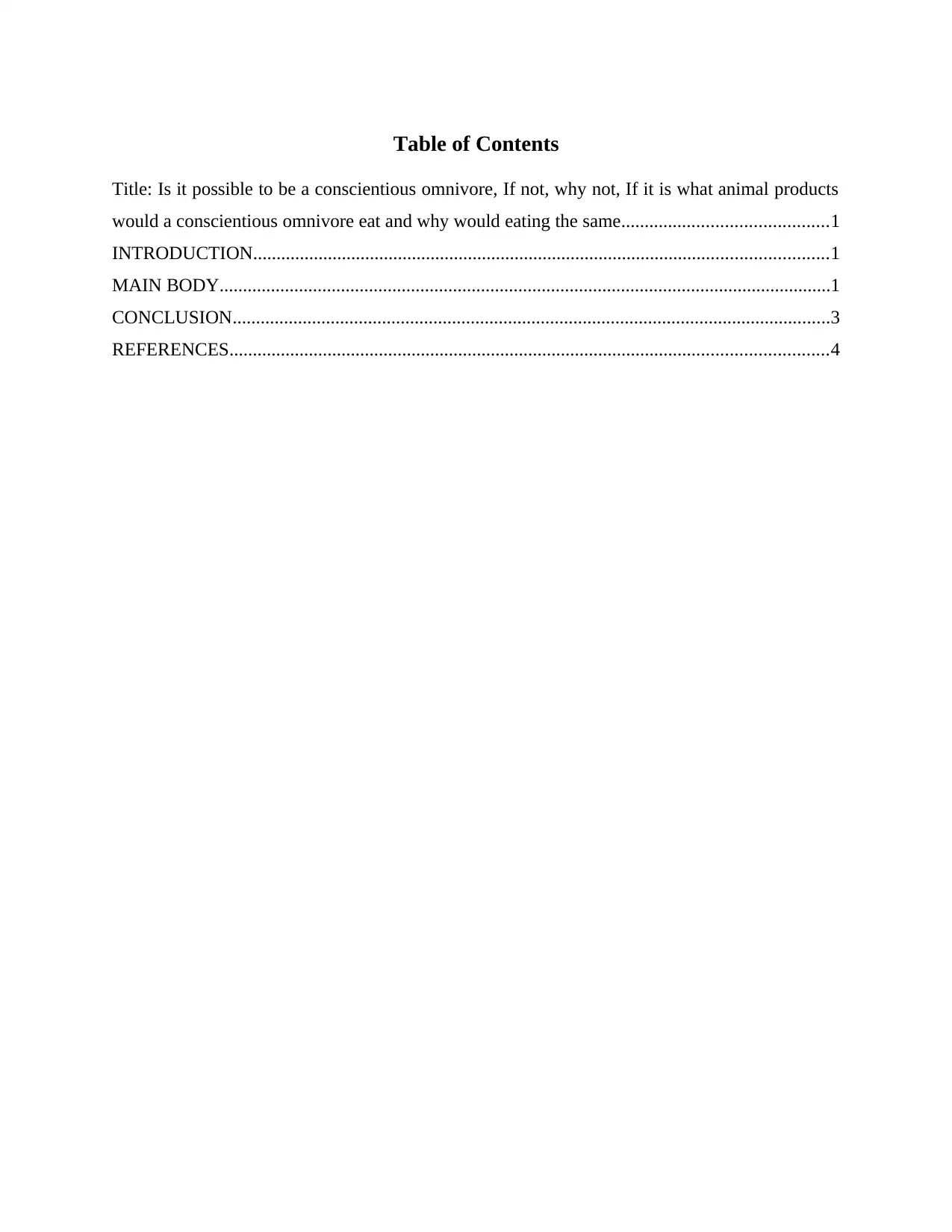
Table of Contents
Title: Is it possible to be a conscientious omnivore, If not, why not, If it is what animal products
would a conscientious omnivore eat and why would eating the same............................................1
INTRODUCTION...........................................................................................................................1
MAIN BODY...................................................................................................................................1
CONCLUSION................................................................................................................................3
REFERENCES................................................................................................................................4
Title: Is it possible to be a conscientious omnivore, If not, why not, If it is what animal products
would a conscientious omnivore eat and why would eating the same............................................1
INTRODUCTION...........................................................................................................................1
MAIN BODY...................................................................................................................................1
CONCLUSION................................................................................................................................3
REFERENCES................................................................................................................................4

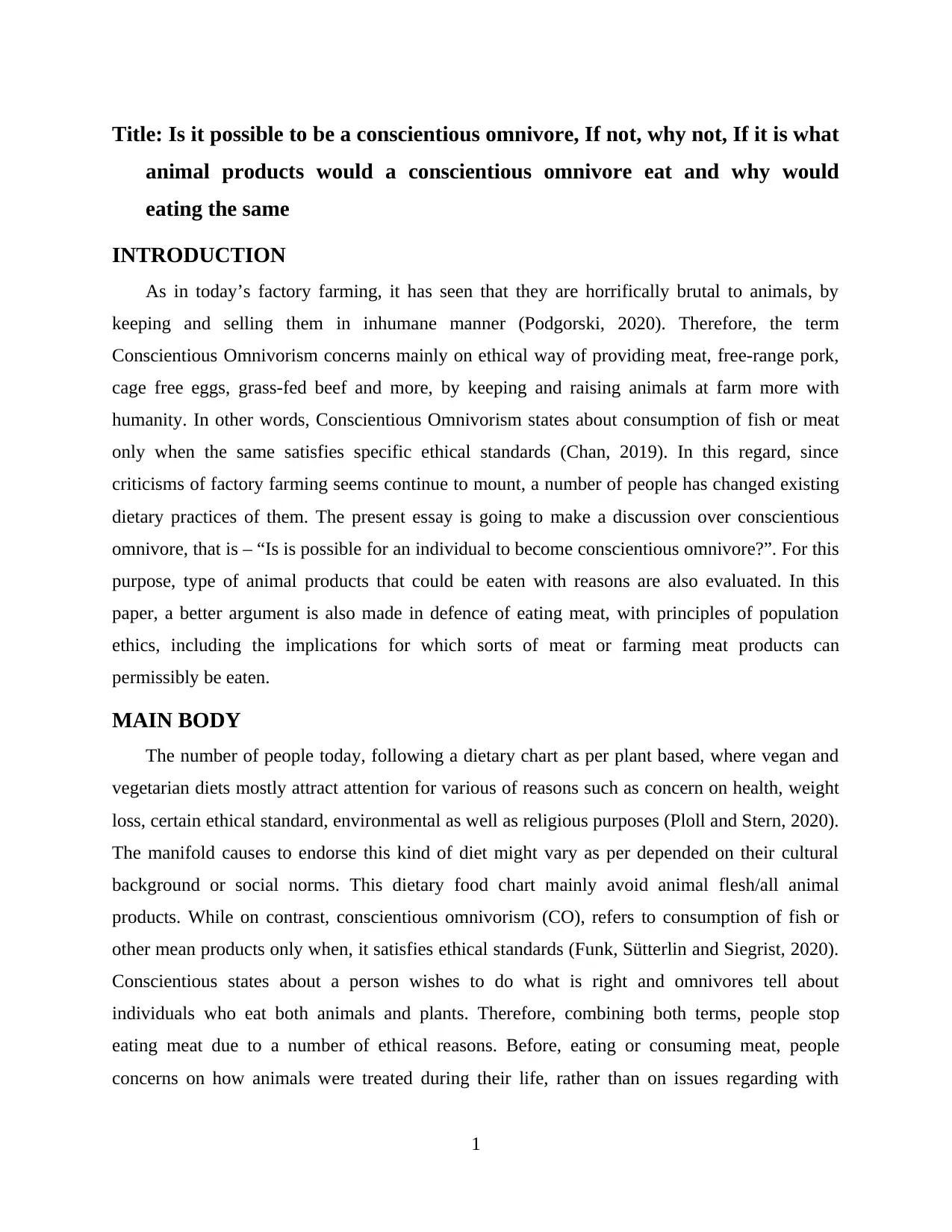
Title: Is it possible to be a conscientious omnivore, If not, why not, If it is what
animal products would a conscientious omnivore eat and why would
eating the same
INTRODUCTION
As in today’s factory farming, it has seen that they are horrifically brutal to animals, by
keeping and selling them in inhumane manner (Podgorski, 2020). Therefore, the term
Conscientious Omnivorism concerns mainly on ethical way of providing meat, free-range pork,
cage free eggs, grass-fed beef and more, by keeping and raising animals at farm more with
humanity. In other words, Conscientious Omnivorism states about consumption of fish or meat
only when the same satisfies specific ethical standards (Chan, 2019). In this regard, since
criticisms of factory farming seems continue to mount, a number of people has changed existing
dietary practices of them. The present essay is going to make a discussion over conscientious
omnivore, that is – “Is is possible for an individual to become conscientious omnivore?”. For this
purpose, type of animal products that could be eaten with reasons are also evaluated. In this
paper, a better argument is also made in defence of eating meat, with principles of population
ethics, including the implications for which sorts of meat or farming meat products can
permissibly be eaten.
MAIN BODY
The number of people today, following a dietary chart as per plant based, where vegan and
vegetarian diets mostly attract attention for various of reasons such as concern on health, weight
loss, certain ethical standard, environmental as well as religious purposes (Ploll and Stern, 2020).
The manifold causes to endorse this kind of diet might vary as per depended on their cultural
background or social norms. This dietary food chart mainly avoid animal flesh/all animal
products. While on contrast, conscientious omnivorism (CO), refers to consumption of fish or
other mean products only when, it satisfies ethical standards (Funk, Sütterlin and Siegrist, 2020).
Conscientious states about a person wishes to do what is right and omnivores tell about
individuals who eat both animals and plants. Therefore, combining both terms, people stop
eating meat due to a number of ethical reasons. Before, eating or consuming meat, people
concerns on how animals were treated during their life, rather than on issues regarding with
1
animal products would a conscientious omnivore eat and why would
eating the same
INTRODUCTION
As in today’s factory farming, it has seen that they are horrifically brutal to animals, by
keeping and selling them in inhumane manner (Podgorski, 2020). Therefore, the term
Conscientious Omnivorism concerns mainly on ethical way of providing meat, free-range pork,
cage free eggs, grass-fed beef and more, by keeping and raising animals at farm more with
humanity. In other words, Conscientious Omnivorism states about consumption of fish or meat
only when the same satisfies specific ethical standards (Chan, 2019). In this regard, since
criticisms of factory farming seems continue to mount, a number of people has changed existing
dietary practices of them. The present essay is going to make a discussion over conscientious
omnivore, that is – “Is is possible for an individual to become conscientious omnivore?”. For this
purpose, type of animal products that could be eaten with reasons are also evaluated. In this
paper, a better argument is also made in defence of eating meat, with principles of population
ethics, including the implications for which sorts of meat or farming meat products can
permissibly be eaten.
MAIN BODY
The number of people today, following a dietary chart as per plant based, where vegan and
vegetarian diets mostly attract attention for various of reasons such as concern on health, weight
loss, certain ethical standard, environmental as well as religious purposes (Ploll and Stern, 2020).
The manifold causes to endorse this kind of diet might vary as per depended on their cultural
background or social norms. This dietary food chart mainly avoid animal flesh/all animal
products. While on contrast, conscientious omnivorism (CO), refers to consumption of fish or
other mean products only when, it satisfies ethical standards (Funk, Sütterlin and Siegrist, 2020).
Conscientious states about a person wishes to do what is right and omnivores tell about
individuals who eat both animals and plants. Therefore, combining both terms, people stop
eating meat due to a number of ethical reasons. Before, eating or consuming meat, people
concerns on how animals were treated during their life, rather than on issues regarding with
1
Secure Best Marks with AI Grader
Need help grading? Try our AI Grader for instant feedback on your assignments.
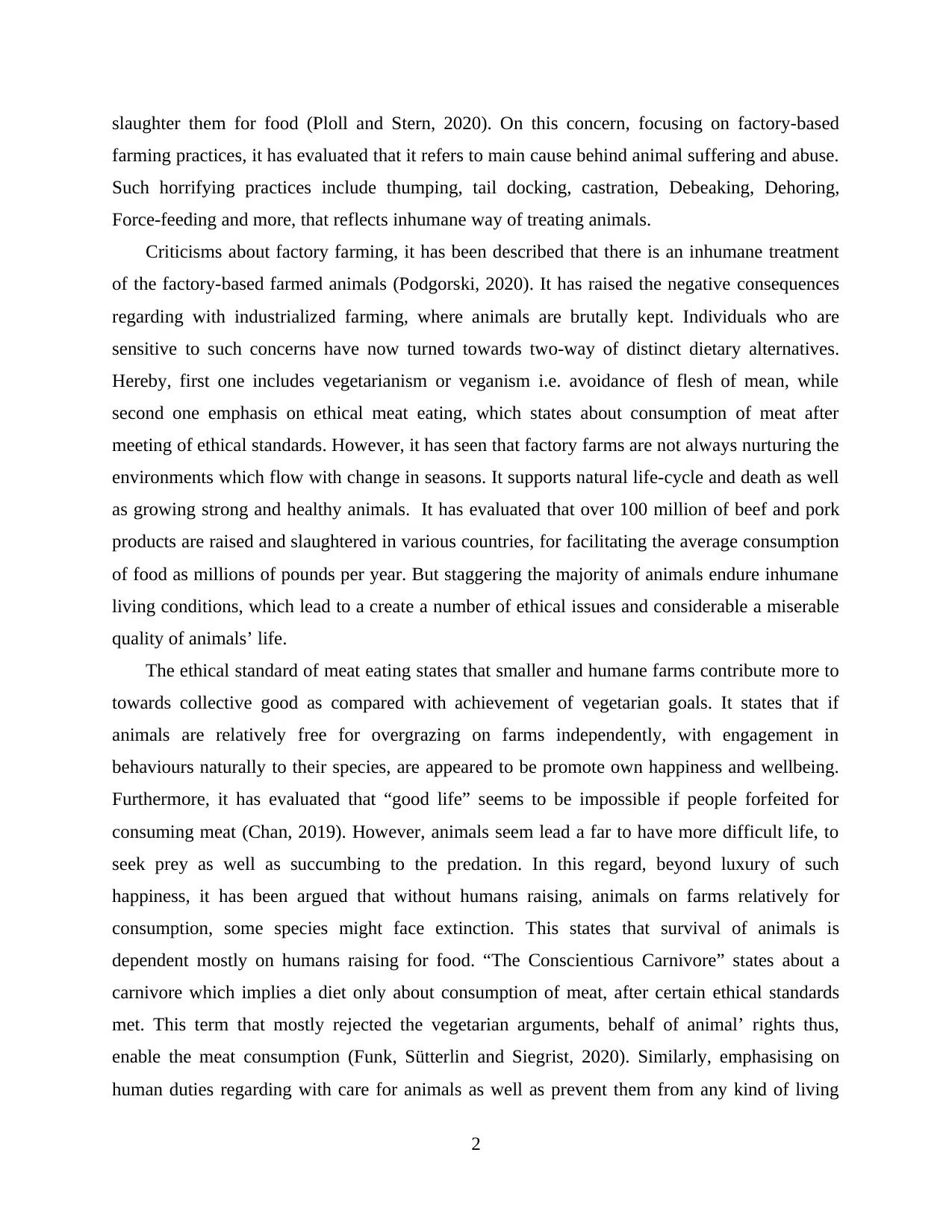
slaughter them for food (Ploll and Stern, 2020). On this concern, focusing on factory-based
farming practices, it has evaluated that it refers to main cause behind animal suffering and abuse.
Such horrifying practices include thumping, tail docking, castration, Debeaking, Dehoring,
Force-feeding and more, that reflects inhumane way of treating animals.
Criticisms about factory farming, it has been described that there is an inhumane treatment
of the factory-based farmed animals (Podgorski, 2020). It has raised the negative consequences
regarding with industrialized farming, where animals are brutally kept. Individuals who are
sensitive to such concerns have now turned towards two-way of distinct dietary alternatives.
Hereby, first one includes vegetarianism or veganism i.e. avoidance of flesh of mean, while
second one emphasis on ethical meat eating, which states about consumption of meat after
meeting of ethical standards. However, it has seen that factory farms are not always nurturing the
environments which flow with change in seasons. It supports natural life-cycle and death as well
as growing strong and healthy animals. It has evaluated that over 100 million of beef and pork
products are raised and slaughtered in various countries, for facilitating the average consumption
of food as millions of pounds per year. But staggering the majority of animals endure inhumane
living conditions, which lead to a create a number of ethical issues and considerable a miserable
quality of animals’ life.
The ethical standard of meat eating states that smaller and humane farms contribute more to
towards collective good as compared with achievement of vegetarian goals. It states that if
animals are relatively free for overgrazing on farms independently, with engagement in
behaviours naturally to their species, are appeared to be promote own happiness and wellbeing.
Furthermore, it has evaluated that “good life” seems to be impossible if people forfeited for
consuming meat (Chan, 2019). However, animals seem lead a far to have more difficult life, to
seek prey as well as succumbing to the predation. In this regard, beyond luxury of such
happiness, it has been argued that without humans raising, animals on farms relatively for
consumption, some species might face extinction. This states that survival of animals is
dependent mostly on humans raising for food. “The Conscientious Carnivore” states about a
carnivore which implies a diet only about consumption of meat, after certain ethical standards
met. This term that mostly rejected the vegetarian arguments, behalf of animal’ rights thus,
enable the meat consumption (Funk, Sütterlin and Siegrist, 2020). Similarly, emphasising on
human duties regarding with care for animals as well as prevent them from any kind of living
2
farming practices, it has evaluated that it refers to main cause behind animal suffering and abuse.
Such horrifying practices include thumping, tail docking, castration, Debeaking, Dehoring,
Force-feeding and more, that reflects inhumane way of treating animals.
Criticisms about factory farming, it has been described that there is an inhumane treatment
of the factory-based farmed animals (Podgorski, 2020). It has raised the negative consequences
regarding with industrialized farming, where animals are brutally kept. Individuals who are
sensitive to such concerns have now turned towards two-way of distinct dietary alternatives.
Hereby, first one includes vegetarianism or veganism i.e. avoidance of flesh of mean, while
second one emphasis on ethical meat eating, which states about consumption of meat after
meeting of ethical standards. However, it has seen that factory farms are not always nurturing the
environments which flow with change in seasons. It supports natural life-cycle and death as well
as growing strong and healthy animals. It has evaluated that over 100 million of beef and pork
products are raised and slaughtered in various countries, for facilitating the average consumption
of food as millions of pounds per year. But staggering the majority of animals endure inhumane
living conditions, which lead to a create a number of ethical issues and considerable a miserable
quality of animals’ life.
The ethical standard of meat eating states that smaller and humane farms contribute more to
towards collective good as compared with achievement of vegetarian goals. It states that if
animals are relatively free for overgrazing on farms independently, with engagement in
behaviours naturally to their species, are appeared to be promote own happiness and wellbeing.
Furthermore, it has evaluated that “good life” seems to be impossible if people forfeited for
consuming meat (Chan, 2019). However, animals seem lead a far to have more difficult life, to
seek prey as well as succumbing to the predation. In this regard, beyond luxury of such
happiness, it has been argued that without humans raising, animals on farms relatively for
consumption, some species might face extinction. This states that survival of animals is
dependent mostly on humans raising for food. “The Conscientious Carnivore” states about a
carnivore which implies a diet only about consumption of meat, after certain ethical standards
met. This term that mostly rejected the vegetarian arguments, behalf of animal’ rights thus,
enable the meat consumption (Funk, Sütterlin and Siegrist, 2020). Similarly, emphasising on
human duties regarding with care for animals as well as prevent them from any kind of living
2
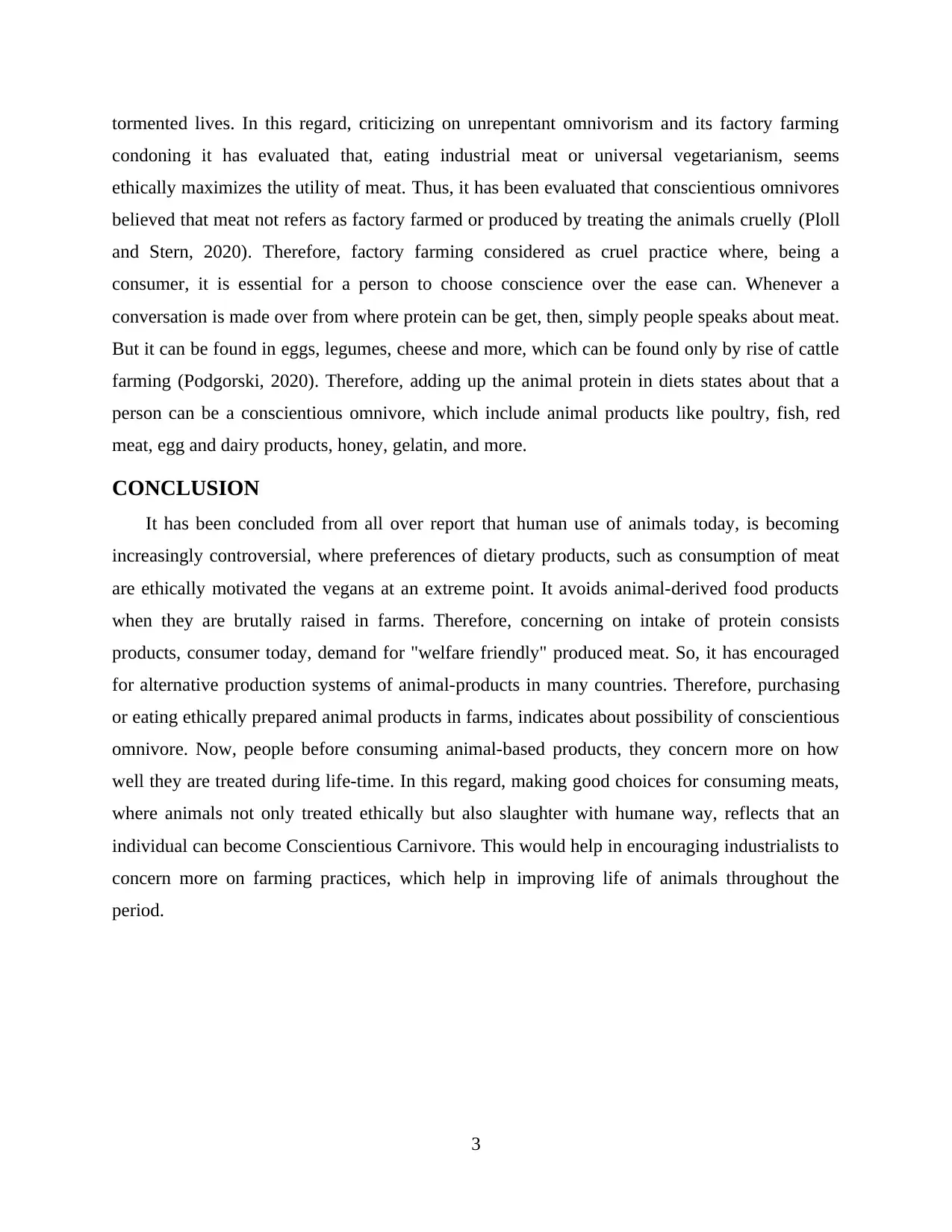
tormented lives. In this regard, criticizing on unrepentant omnivorism and its factory farming
condoning it has evaluated that, eating industrial meat or universal vegetarianism, seems
ethically maximizes the utility of meat. Thus, it has been evaluated that conscientious omnivores
believed that meat not refers as factory farmed or produced by treating the animals cruelly (Ploll
and Stern, 2020). Therefore, factory farming considered as cruel practice where, being a
consumer, it is essential for a person to choose conscience over the ease can. Whenever a
conversation is made over from where protein can be get, then, simply people speaks about meat.
But it can be found in eggs, legumes, cheese and more, which can be found only by rise of cattle
farming (Podgorski, 2020). Therefore, adding up the animal protein in diets states about that a
person can be a conscientious omnivore, which include animal products like poultry, fish, red
meat, egg and dairy products, honey, gelatin, and more.
CONCLUSION
It has been concluded from all over report that human use of animals today, is becoming
increasingly controversial, where preferences of dietary products, such as consumption of meat
are ethically motivated the vegans at an extreme point. It avoids animal-derived food products
when they are brutally raised in farms. Therefore, concerning on intake of protein consists
products, consumer today, demand for "welfare friendly" produced meat. So, it has encouraged
for alternative production systems of animal-products in many countries. Therefore, purchasing
or eating ethically prepared animal products in farms, indicates about possibility of conscientious
omnivore. Now, people before consuming animal-based products, they concern more on how
well they are treated during life-time. In this regard, making good choices for consuming meats,
where animals not only treated ethically but also slaughter with humane way, reflects that an
individual can become Conscientious Carnivore. This would help in encouraging industrialists to
concern more on farming practices, which help in improving life of animals throughout the
period.
3
condoning it has evaluated that, eating industrial meat or universal vegetarianism, seems
ethically maximizes the utility of meat. Thus, it has been evaluated that conscientious omnivores
believed that meat not refers as factory farmed or produced by treating the animals cruelly (Ploll
and Stern, 2020). Therefore, factory farming considered as cruel practice where, being a
consumer, it is essential for a person to choose conscience over the ease can. Whenever a
conversation is made over from where protein can be get, then, simply people speaks about meat.
But it can be found in eggs, legumes, cheese and more, which can be found only by rise of cattle
farming (Podgorski, 2020). Therefore, adding up the animal protein in diets states about that a
person can be a conscientious omnivore, which include animal products like poultry, fish, red
meat, egg and dairy products, honey, gelatin, and more.
CONCLUSION
It has been concluded from all over report that human use of animals today, is becoming
increasingly controversial, where preferences of dietary products, such as consumption of meat
are ethically motivated the vegans at an extreme point. It avoids animal-derived food products
when they are brutally raised in farms. Therefore, concerning on intake of protein consists
products, consumer today, demand for "welfare friendly" produced meat. So, it has encouraged
for alternative production systems of animal-products in many countries. Therefore, purchasing
or eating ethically prepared animal products in farms, indicates about possibility of conscientious
omnivore. Now, people before consuming animal-based products, they concern more on how
well they are treated during life-time. In this regard, making good choices for consuming meats,
where animals not only treated ethically but also slaughter with humane way, reflects that an
individual can become Conscientious Carnivore. This would help in encouraging industrialists to
concern more on farming practices, which help in improving life of animals throughout the
period.
3
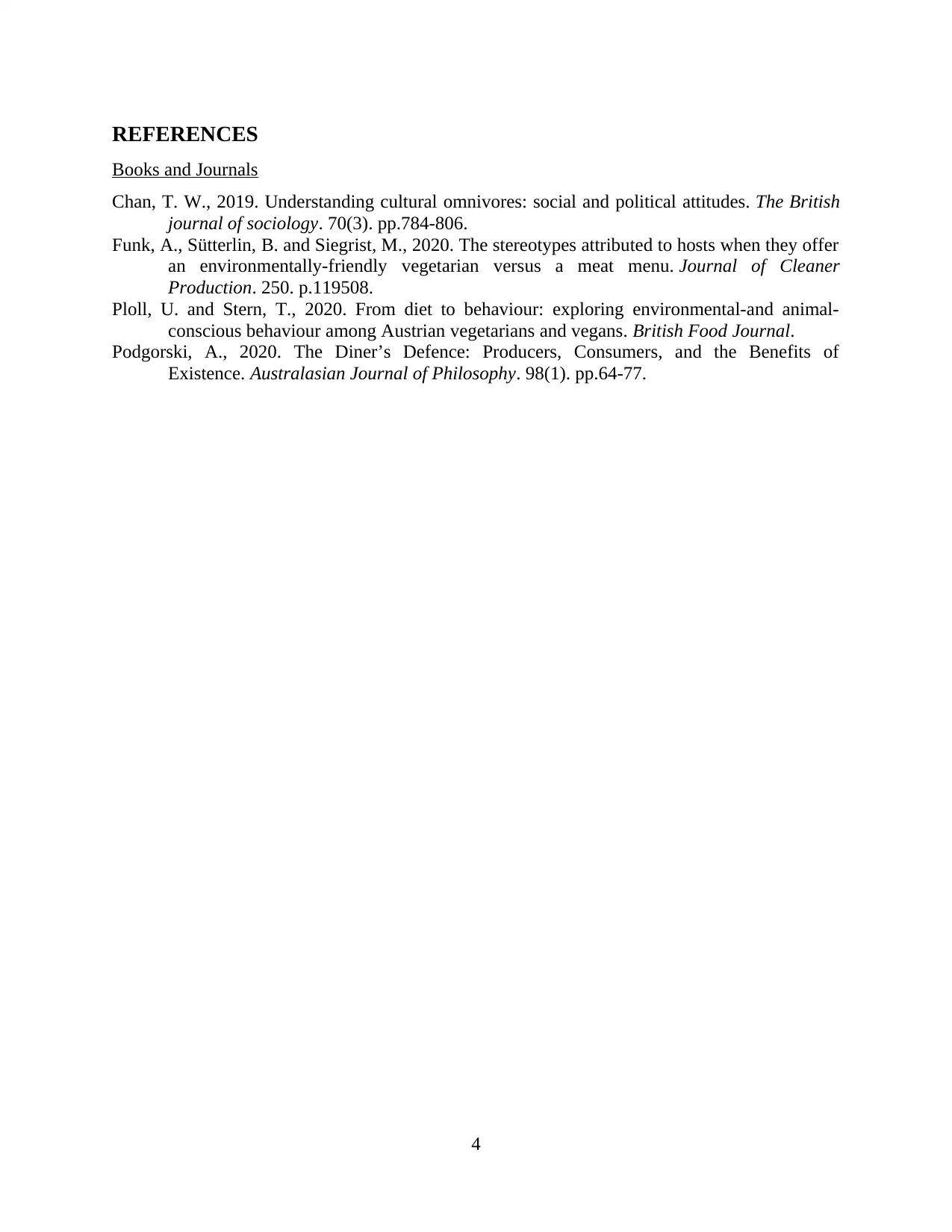
REFERENCES
Books and Journals
Chan, T. W., 2019. Understanding cultural omnivores: social and political attitudes. The British
journal of sociology. 70(3). pp.784-806.
Funk, A., Sütterlin, B. and Siegrist, M., 2020. The stereotypes attributed to hosts when they offer
an environmentally-friendly vegetarian versus a meat menu. Journal of Cleaner
Production. 250. p.119508.
Ploll, U. and Stern, T., 2020. From diet to behaviour: exploring environmental-and animal-
conscious behaviour among Austrian vegetarians and vegans. British Food Journal.
Podgorski, A., 2020. The Diner’s Defence: Producers, Consumers, and the Benefits of
Existence. Australasian Journal of Philosophy. 98(1). pp.64-77.
4
Books and Journals
Chan, T. W., 2019. Understanding cultural omnivores: social and political attitudes. The British
journal of sociology. 70(3). pp.784-806.
Funk, A., Sütterlin, B. and Siegrist, M., 2020. The stereotypes attributed to hosts when they offer
an environmentally-friendly vegetarian versus a meat menu. Journal of Cleaner
Production. 250. p.119508.
Ploll, U. and Stern, T., 2020. From diet to behaviour: exploring environmental-and animal-
conscious behaviour among Austrian vegetarians and vegans. British Food Journal.
Podgorski, A., 2020. The Diner’s Defence: Producers, Consumers, and the Benefits of
Existence. Australasian Journal of Philosophy. 98(1). pp.64-77.
4
1 out of 7
Related Documents
Your All-in-One AI-Powered Toolkit for Academic Success.
+13062052269
info@desklib.com
Available 24*7 on WhatsApp / Email
![[object Object]](/_next/static/media/star-bottom.7253800d.svg)
Unlock your academic potential
© 2024 | Zucol Services PVT LTD | All rights reserved.
